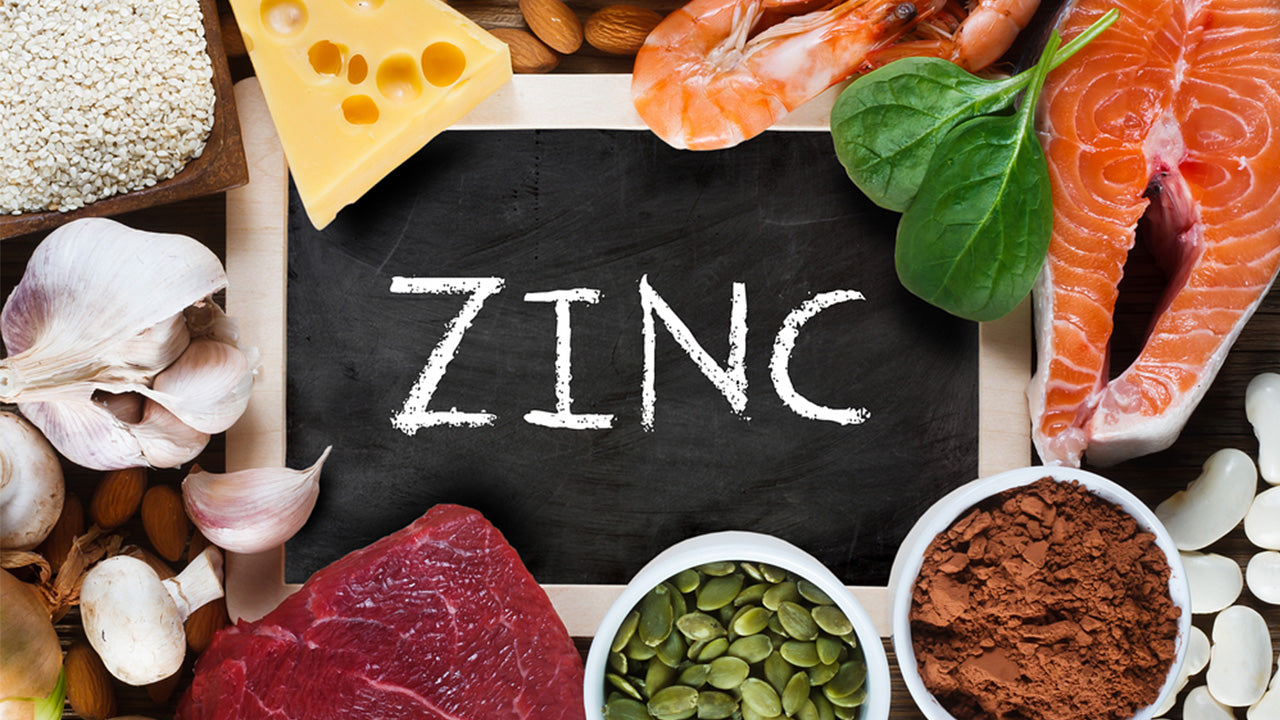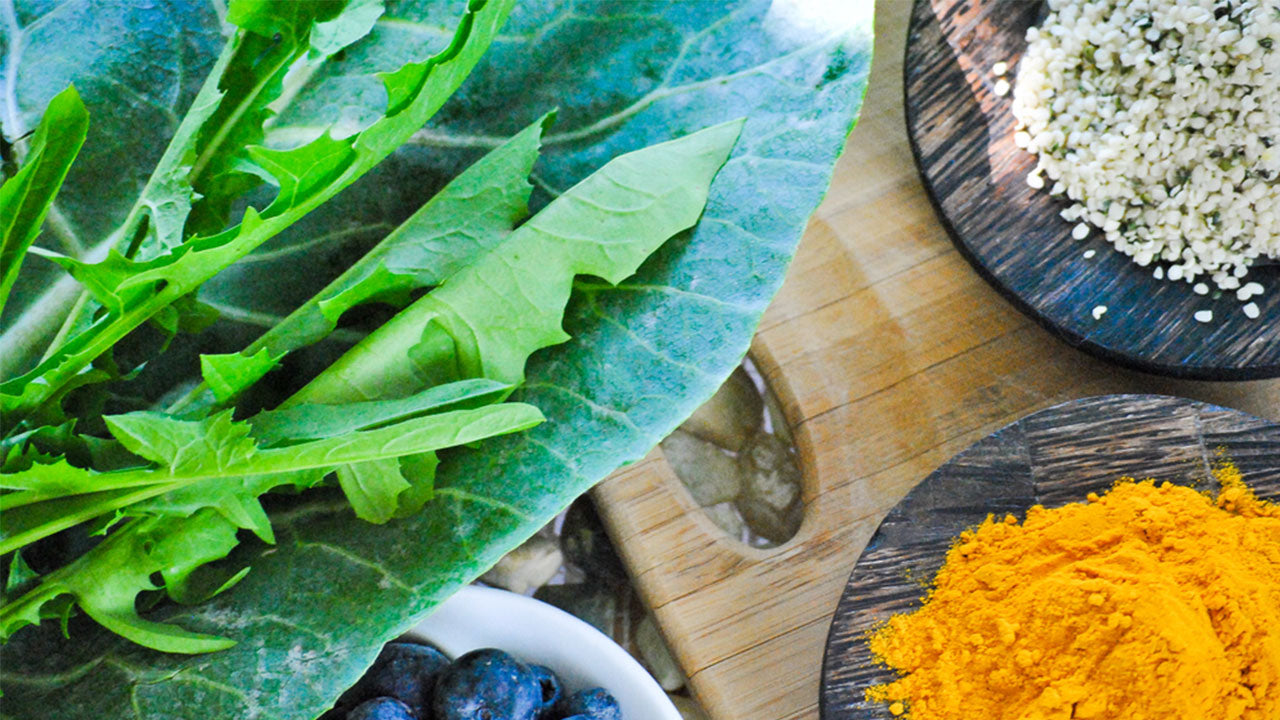Top 12 Foods with Zinc
 By: by Amino Science
By: by Amino Science

Zinc is a trace mineral found throughout the body that is necessary for our immune system's function, cell growth and division, wound healing, and our senses of taste and smell. Zinc is needed in over 300 enzyme functions in the body, and yet the body doesn't store zinc as a reserve. Instead, zinc is used as needed to metabolize nutrients, and so we need to get a regular supply of it via our food or dietary supplement. For men this means 11 milligrams of zinc per day, and for women, it's 8 milligrams unless they are pregnant or breastfeeding, when the requirement jumps up to 12 milligrams per day. This article will explore the symptoms and consequences of zinc deficiency, plus arm you with a list of the top 12 foods with zinc, so you'll never have to go without this important nutrient.
Symptoms of Zinc Deficiency and Those at Risk
If you are a vegetarian or vegan, you might be more prone to zinc deficiency due to a lack of meat in your diet. Likewise those with digestive diseases such as Crohn's disease, celiac disease, or ulcerative colitis may develop a deficiency due to poor absorption rates. Those with certain cancers, alcohol addiction, or diabetes are also at a higher risk. Breastfeeding and pregnant women, the elderly, as well as children and teens run the risk of becoming zinc deficient more easily. What follows next is a list of symptoms, so you can better recognize the signs of zinc deficiency.
- Slowed growth
- Poor immune functioning
- Appetite loss
- Hair loss
- Impaired wound healing
- Diarrhea
- Unexplained weight loss
- Compromised night vision
- White spots on nails
- A funny-tasting sensation
- Lethargy
- Fine tremors (unintentional muscle movements)
A moderate deficiency can be fixed with dietary changes. A severe deficiency may require zinc supplements and advice from a medical professional on how to best restore zinc levels.
The Top 12 Foods with Zinc
If you're looking for foods high in zinc, look no further than the following list of top 12 zinc-rich foods.

1. Legumes
Legumes include lentils, beans, and chickpeas, and are some of the best foods around for those who don't eat meat to gain plant sources of protein and zinc. In 100 grams of lentils for example, you can get 12% of the daily recommended intake of zinc (for a man or pregnant/nursing woman).
Animal sources of zinc are better absorbed due to the fact that legumes also contain phytates, which can inhibit the absorption of zinc and other minerals. Regardless, legumes are an excellent source of fiber and protein that can be easily included in stews, salads, and soups—an easy and beneficial addition.
Bioavailability can also be increased with sprouting, fermenting, and soaking plant sources of zinc, which is great news for those seeking foods with zinc for vegan diets.
2. Meat
Meat is a strong source of zinc, especially red meat. Lamb, pork, bison, and beef are foods with high zinc and iron content, plus creatine and B vitamins. For zinc, raw ground beef contains 4.8 milligrams of zinc, 43% of a man's RDI.
Though not everyone will want to eat large amounts of red meat due to its association with heart disease, it can still nevertheless be included moderately in a balanced diet to gain the positives without risking much in negative effects.
3. Seeds
Squash seeds, flaxseeds, sesame seeds, hemp seeds, and pumpkin seeds: all of these seeds help increase your zinc intake. They can be easily added to other foods like yogurts and salads, or enjoyed on their own as snacks in trail mixes or granola bars.
Some seeds contain more zinc than others. Hemp seeds in particular have 31% of a man's RDI in just 3 tablespoons (30 grams) of seeds. That being said, sesame, squash, and pumpkin seeds each have significant amounts of zinc, as well as fiber, vitamins, minerals, and healthy fats. Including more seeds in your diet can help to lower blood pressure and reduce cholesterol, so they're a fantastic resource for your health.
4. Shellfish
Shellfish like oysters and shrimp are low-calorie, healthy sources of zinc. Just six medium oysters can provide 32 milligrams of zinc, 290% of a man's recommended daily intake. This category includes Alaskan crab, clams, scallops, mussels, and lobster.
It's recommended that you cook shellfish thoroughly to avoid food poisoning, and also that you use a wet heat method of cooking like steaming, boiling, poaching, or braising instead of dry heat methods like grilling, broiling, sautéing, roasting, or baking, as those tend to reduce the zinc levels in shellfish.
5. Eggs
Eggs have about 5% of a man's RDI per large whole egg, and they also bring 5 grams of healthy fats, 6 grams of protein, and vitamins and minerals. One of the foods with high zinc and selenium content, eggs also have an assortment of B vitamins and choline, which is important for many of the steps in our metabolism, and a nutrient that most of us do not get enough of from our diets.
6. Nuts
Cashews, almonds, peanuts (yes, we know technically they're legumes but we're eating them like nuts!), pine nuts, and more: all of these nuts can boost your zinc intake, as well as provide healthy fats, fiber, and a dazzling array of other vitamins and nutrients like iron, calcium, vitamin E, and folate.
Nuts are foods with zinc and magnesium, and among the nuts, your best source of zinc are cashews, with about 14% of a man's RDI amount in a 1-ounce serving. Convenient, hearth healthy, and excellent for reducing the risk factors of diabetes, nuts have also been associated with greater longevity.
7. Certain Vegetables
Though vegetables and plant foods tend to be poorer sources of zinc than animal products, it's nevertheless possible to get zinc from certain vegetables. For those who don't eat meat, both sweet and regular potatoes have about 1 gram of zinc per large spud, 9% of a man's daily recommended. Green veggies like green beans and kale contribute a small portion of zinc as well, about 3% of the RDI per 100 grams. While they may not contain a lot of zinc, greens like kale do contain chart-topping portions of vitamin K and vitamin A, and a vegetable-rich diet is associated with risk reduction for conditions like heart disease and cancer.
8. Dairy Products
Dairy products like milk and cheese have high amounts of particularly bioavailable zinc, meaning it's more easily absorbed by your body. Just 100 grams of cheddar cheese has around 28% of a man's RDI of zinc, and 1 cup of full-fat milk has about 9%. With calcium for bone health, vitamin D, and protein, dairy products are good sources of zinc, especially for any lacto-vegetarians.
9. Certain Fruits
Zinc-rich fruits include avocados, blackberries, pomegranate, raspberries, guava, cantaloupe, apricots, peaches, kiwifruit, and blueberries. With healthy fats in avocados and the anti-inflammatory and antioxidant properties of berries, though they don't have very much zinc content compared to animal sources, these fruits are nevertheless more food sources that can help keep your body plentiful with zinc.
10. Whole Grains
Wheat, rice, oats, and quinoa each contain some zinc, though like the legumes listed above, they also contain phytates that can bind with zinc and inhibit its absorption. Whole grains contain more phytates than refined grains do, but they are still better for your health overall, as they also contain nutrients like B vitamins, selenium, magnesium, iron, and valuable fiber. Eating whole grains is associated with a reduced risk of obesity, type 2 diabetes, and heart disease, and so very much worth including in your diet for the other health benefits they bring.
11. Dark Chocolate
Among the foods with zinc and copper, dark chocolate has pretty fair amounts of zinc, about 30% of a man's daily recommended intake with 3.3 milligrams of zinc per 100 grams. The only issue, of course, is that 100 grams of dark chocolate means 600 calories worth of food, so though dark chocolate has valuable nutrient content, it's still a food that is best eaten in moderation, and not thought of as a main source of zinc.
12. Fortified Breakfast Cereals
Fortified breakfast cereals are a good source of zinc because they're designed to make up the difference in specific vitamins and nutrients we're often lacking in our diets. Great for growing children and adults, certain breakfast cereals will not only provide you with the benefits of zinc, but also with calcium, dietary fiber, and a cavalcade of vitamins.
From A to Zinc
Good sources of zinc like meat, nuts, seafood, dairy, and legumes are great to have as staples in your diet. The foods containing only marginal amounts of this essential mineral are still important too, as they round out your diet in a balanced fashion. Now you know that foods containing zinc are as diverse as they come, from just about every building block on the food pyramid. With their help, you could get regular amounts of zinc every day, and hardly notice the effort!
Joining zinc as a critical nutrient you may not be getting enough of are essential amino acids, the building blocks of protein. If you are looking to fortify your health with supplemental support, we highly encourage you to add a daily essential amino acid supplement to your regimen.

Up to 25% off Amino
Shop NowTAGS: food
Join the Community
Comments (0)
Most Craveable Recipes




 833-264-6620
833-264-6620



















